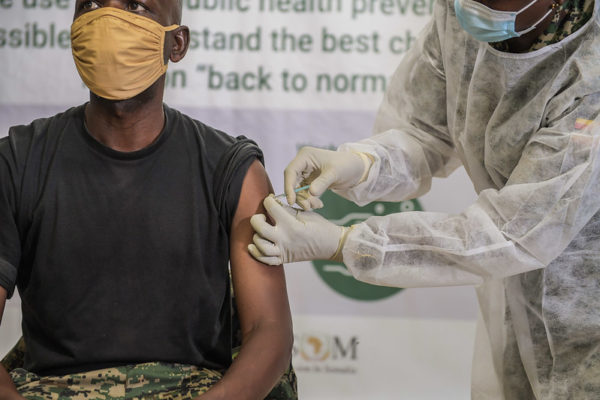
A Ugandan soldier serving under the African Union Mission in Somalia (AMISOM) takes the COVID-19 jab at the launch of the COVID-19 vaccination campaign in Mogadishu, Somalia on 17 May 2021. AMISOM Photo/Mokhtar Mohamed (Flick)
by Larissa Gao
The revealed distribution of false and substandard vaccines in Uganda has further undermined citizens’ trust in government and the vaccination process at the peak of a new wave of COVID-19, according to a local civil society leader.
In Uganda, eight hundred people received counterfeit COVID-19 vaccines, a number of which contained water instead of a vaccine dose. Two medical workers involved in the scam have been arrested, while the third known perpetrator—a doctor—remains on the run.
The scam was caused by “corruption and failure to monitor the vaccine distribution chain,” said Cissy Kagaba, executive director of the Anti-Corruption Coalition Uganda (ACCU). She added: “It exacerbated [people’s] lack of trust in the government.
Against the backdrop of a spike in coronavirus cases and the rise of the delta variant, compounded by a shortage of vaccine doses and an inefficient distribution process, many in Uganda sought options to pay for a vaccine. Currently, they are provided for free by the government of Uganda at designated health centers. Those willing to pay for a shot became the primary targets of the false vaccine scam.
The resulting loss of trust caused by the scandal may, according to Kagaba, result in a greater degree of vaccine hesitancy. She noted that many who received a first dose of the vaccine—not the counterfeit doses—may no longer seek a second dose because of this incident and the resulting loss of trust in the government.
While the government must take steps to improve the distribution process, she said that those who have capitalized on the pandemic as a business opportunity continue to undermine efforts to achieve equitable and transparent vaccine distribution.
To learn more about the vaccine scandal in Uganda and its impact on society, as well as the role of civil society in improving vaccine distribution, the Partnership for Transparency (PTF)’s Larissa Gao spoke with Kagaba. Here are highlights from their conversation:
Q: How did people discover that they were given fake vaccines?
CK: The story was broken by the media through a whistleblower. The recipients did not know that they had been injected with water.
Q: How could this kind of issue happen in Uganda?
CK: Corruption and failure to monitor the vaccine distribution chain. There is also no clear vaccination policy in the country in terms of prioritization, distribution, management, and other aspects of the vaccination distribution chain. The documentation of the vaccines is also poor, as some health facilities have received vaccines but without recording books and vaccination cards. This makes the entire process susceptible to manipulation.
Q: What has been the impact of this incident?
CK: It has exacerbated peoples’ lack of trust in the government. As a result, people may be hesitant to be vaccinated. Some of the people, who went for the first vaccine, are now hesitant about going back for the second dose [because of the vaccine incident]. This also lends credence to the suspicions and misinformation regarding COVID-19 vaccines.
Q: How can situations like this be avoided in the future?
CK: The government must follow the same guidelines that it has used before when vaccinating people against other diseases. The challenge is that COVID-19 became a business for some people, and any loopholes in the system have been exploited. The government should also work very closely with local CSOs to monitor vaccination activities and report any inconsistencies.
The views expressed in this article are solely those of the interviewees and do not necessarily reflect the official policies of PTF.
ACCU and PTF have partnered to implement a COVID-19 vaccine monitoring project in Uganda, designed to increase transparency, accountability, and equity in the vaccine distribution process. Learn more about the project here.
For updates, follow the Partnership for Transparency on Twitter @PTFund and on Facebook at Partnership for Transparency Fund.

